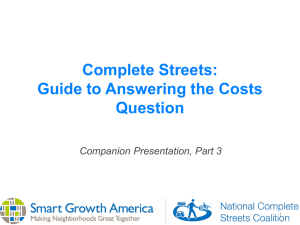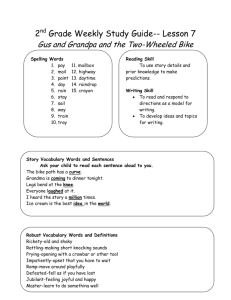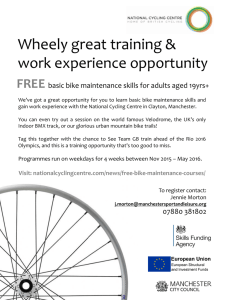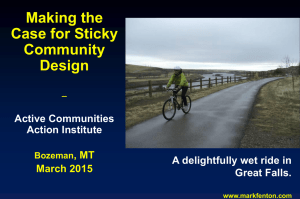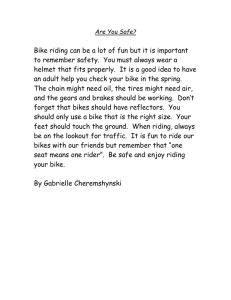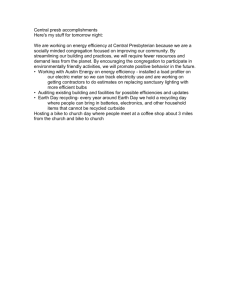– Day 2 MT BACI
advertisement
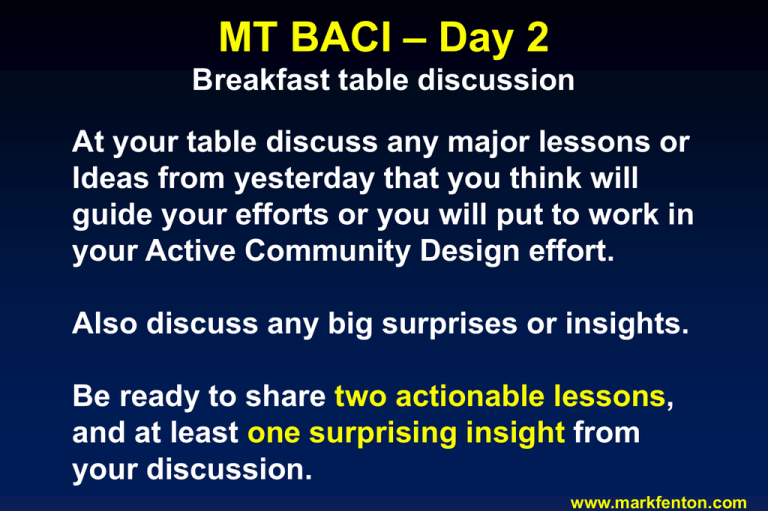
MT BACI – Day 2 Breakfast table discussion At your table discuss any major lessons or Ideas from yesterday that you think will guide your efforts or you will put to work in your Active Community Design effort. Also discuss any big surprises or insights. Be ready to share two actionable lessons, and at least one surprising insight from your discussion. www.markfenton.com So how to get there? (Can we really do it?) Walk audits Implementation Work sessions www.markfenton.com Some elements of success: A. Build a “stealth” team; ID champion(s). B. Engage the community, develop a vision (e.g. walk audits). C. Begin w/ pilot, demonstration projects. D. Target policies & procedures, not programs. (Get sticky w/ P,S,&E.) E. Pick clear goals, timeframes & resources. (Not too many . . .) www.markfenton.com A. Build a compact, focused, interdisciplinary leadership team targeting healthy design: • Education, schools • Planning & Zoning • Engineering, DPW • Parks, Recreation • Public Health & Safety Policy information: • Historical preservation www.lgc.org • Social justice & equity www.vtpi.org • Chamber of Commerce • Developers, Lenders, Realtors • Neighborhood Assoc., Church & Service Groups • Environment, Conservation www.markfenton.com The “org” chart: Bike/Ped Advocates YMCA Parks Rec. AHA ACS ADA Planning Trails Health Transport Employers Hospital Insurer Developers Housing Electeds Transit PTOs DPW Schools Neighborhoods www.markfenton.com The “stealth” chart: Trails Bike/Ped Advocate Rec. Elected Farmland Planning Parks DPW Neighborhoods Vision Transit Enviro. Econ. Devlpmt NAR Banks Developer Housing Employers Health NAHB Chamber Schools PTOs Hospital Insurer ADA Found. ACS AHA Churches Service Orgs. www.markfenton.com To be on the stealth leadership team people must: • Fully embrace vision of active, healthy community design. • Be able to spend time on this as part of job responsibilities; not just volunteers. • Have community influence and be able to reach critical partners. www.markfenton.com Create action teams: • Small, strong, well-connected leadership team. • Tight, focused action teams on specific topics. • No monthly meetings, just functionally targeted work. Zoning ordinance update Transport Trail Plan Leadership Team Complete Streets Sidewalk Program Shared Use SRTS www.markfenton.com B. Launch an Outreach, Education, & Recruitment (OER) Program • Actively recruit engaged citizens to support healthy policy & project efforts. • Educate them on constructive, effective public testimony & discourse (letters to the editor, etc.) • Inform them (email Walk audit blasts, blogs, tweets, phone trees?) of key opportunities for support: meetings, workshops, plans. www.markfenton.com E.g. Anaconda “pop-up” curb extension. But can the biggest truck make the turn? www.markfenton.com Vision document ... One-way pair is built for speed! www.markfenton.com C. Implement Demonstration, Pilot Projects Effective, . . . but generally inexpensive, simple, & reversible. americawalks.org www.markfenton.com Evidence, facility design, cost estimating, wayfinding. Companion pieces . . . • Getting the community on board. • Resources. Walk audits, inventory, events & short-term trials, Complete Streets resolution. www.markfenton.com E.g paint missing lines. www.markfenton.com Or move them. www.markfenton.com Paint some high visibility crosswalks. Ladder style Artistic www.markfenton.com Add sharrows or a bicycle lane . . . Sharrow www.markfenton.com Diagonal parking increases on-street capacity, but . . . Missoula Anaconda But reverse angle: • Less severe & costly collisions. • Pedestrians off road. • Safer for bikes. www.markfenton.com Wayfinding. Fun & informative Walkyourcity.org www.markfenton.com Street furnishings • Benches • Bike parking • Public art www.markfenton.com Building Travel Furnishings Curb www.markfenton.com Safer Crossings Baltimore Missoula Queens NY www.markfenton.com Park City Montpelier Build a parklet (or a few of them). www.markfenton.com Bicycle parking; use the curb extensions! Salt Lake City library www.markfenton.com Pave shoulders on rural roads; make the case for auto safety! First priority: routes to schools, parks, housing, shopping centers. www.markfenton.com Reasons for shoulders? • Safety: Vehicle recovery zone; accommodate driver error; space for evasive maneuvers; clearance for avoiding crossing peds & bikes; space for disabled vehicles, . . . • Capacity: Easier exiting from travel lanes to side streets; greater effective turning radius for trucks; space for mail delivery & bus stops, . . . • Maintenance: Structural support to lane edge; storm water discharge is further from lane; space for maintenance operations & signs, snow storage, & painting of fog lines. (Michael www.walkable.org/assets/downloads/ Ronkin) 22 Reasons for Paved Shoulders.pdfwww.markfenton.com D. Policies & procedures, not programs. Fenton, Community Design . . ., Childhood Obesity, 8(1); Feb 2012. • • • • • Master planning, zoning, subdivision rules, for mixed use, open space conservation. Complete streets guidelines & routine practice. Transportation trail networks. Bicycle & transit infrastructure & incentives; Transportation Demand Management (TDM). Schools as centers of community health, including Safe Routes to School. www.markfenton.com Choices in Active Living Resource Guide: 1. Growth Policy. 6. Transportation Districts. 2. Transportation Plan. 7. Safe Routes to School. 3. Subdivision Regulations. 8. Joint Use Agreements. 4. Complete Streets. 5. Sidewalk Program. www.markfenton.com 1. Growth policy. WHERE? • Slow the spill out into open space, farm & ranch land. • Concentrate development near existing infrastructure. Terre Haute More of this . . . . . . less of this? www.markfenton.com Economic Development in Rural Communities www.epa.gov/smartgrowth • Support the rural landscape – Working lands, resource areas, & natural lands. • Help existing places, downtowns thrive – Infrastructure, transport • Create great new places – Designate growth areas www.markfenton.com National Highway Cooperative Research Program • Direct jobs & housing to small areas of dense, mixed infrastructure. NCHRP Web-Only Document 211 Imagery Source: Google To minimize increases in VMT in rural & small towns . . . CLOSE TO HOME A Handbook for Transportation-Efficient Growth in Small Communities and Rural Areas Prepared for NCHRP Project No. 25-36 | Transportation Research Board of the National Academies Brian J. Morton1, Joseph Huegy2, and John Poros3 1 Center for Urban and Regional Studies, The University of North Carolina at Chapel Hill, Chapel Hill, NC 2 Institute for Transportation Research and Education, North Carolina State University, Raleigh, NC 3 Carl Small Town Center, College of Architecture, Art, and Design, Mississippi State University, Mississippi State, MS SUBMITTED – SEPTEMBER 2014 • Spread balanced housing & job growth across towns in a region. www.markfenton.com EPA School Siting Guidelines. Shelby • A comprehensive approach to school site decisions. • Broad look at health & environmental impacts. • Assist with new vs. rebuild decisions. www.epa.gov/schools/siting www.markfenton.com School siting, Waterbury CT. Duggan School Focused on rehab more than construction; moving back to K-8 neighborhood schools district-wide. Goals: Lower transportation costs, better behavior, parental involvement, neighborhood engagement. www.markfenton.com 2. Active Transportation Plans Walk, bike, transit; links to destinations. www.markfenton.com 3. Sub-division regulations. • Sidewalks both sides, trails linked to the network, slow traffic. Plus, encourage: • Downtown residential. • Retail growth in the core, not on the edges. Ordinance, not just vision! More of this style. . . . . . less of this? www.markfenton.com How about alleys? Anaconda Bluffton SC www.markfenton.com 4. Complete streets • Pedestrians, cyclists, transit riders, & drivers of all ages & abilities considered in every road project (new, repair, maintenance). www.markfenton.com Typical phases: i. Policy resolution or executive order. ii. Demonstration, pilot projects. iii. Detailed roadway design guidelines. (Pirates’ Code) iv. Planning & engineering (staff, consultants) consider peds, bicycles, & transit in absolutely every project (including routine maintenance). www.markfenton.com Update guidelines, design requirements. • Create new preferred roadway cross-sections & profiles. (E.g. allow 9’-10’ travel lanes on low speed neighborhood streets.) www.markfenton.com Update guidelines, design requirements. • Don’t reinvent the wheel! Nat’l Association of City Transportation Officials have compiled the evidence base & best practices. nacto.org www.markfenton.com Route 87 Roundup, MT www.markfenton.com Route 87 Roundup, MT www.markfenton.com E.g. change standard practice . . . • Multi-modal Transportation Analysis vs. Traffic Impact Analysis (MMTA vs TIA) • Require mitigation for all four modes. E.g. . . . • Turn lanes, signal. • Sidewalk, trail link; benches, trees. • Bike lane, bike parking, sharrows. • Transit shelter, path to entrance. www.markfenton.com 5. Sidewalk construction & maintenance. • Convene team to inventory existing goat paths, sidewalks, trails. • Students, seniors, local residents. • Simple rating: Good/ both; poor/one; none. • Intercept surveys, interviews. UofA multi-use trail Goat trail . . . www.markfenton.com 5. Sidewalk construction & maintenance. • ID & map destinations (e.g. schools, shopping, parks, senior housing). • Rank priority sections, key links. • Funding; district, parking, hospitality fees. • Share costs; revolving loan program? UofA multi-use trail One of the “goats” www.markfenton.com Develop a comprehensive network of Missoula transportation trails. • Connect to other elements of transport network (e.g. sidewalks, bike lanes, transit stops) • Focus on destinations (e.g. schools, shopping, parks, senior housing). • Build into the fabric of the community. UofA multi-use trail Lewistown www.markfenton.com www.markfenton.com 6. Transportation district: shift habits & demand. • Connect transit: bus, dial-a-ride, school bus. • Institutionalize: IDs as • Buses: costs, transit passes, tie to coverage, time, wellness programs! frequency(?) • E.g. colleges, city employees, hospitals . . . • Less parking not more! www.markfenton.com Create a bicycle-friendly community, business, campus . . . • Bike lanes, sharrows on wide streets. • Bike parking at destinations: schools, library, farmers market. • Maps, way-finding signs, route markers. • Bike sharing? www.bikeleague.org Bozeman Missoula Helena Billings www.markfenton.com www.markfenton.com Blue Island, IL Classroom, on-bike, build & maintain. bibc.us www.markfenton.com www.markfenton.com 7. Safe Routes to School – more than just an encouragement program! Columbia, MO • All 5 E’s: Engineer bike lanes, racks, sidewalks; educate & encourage walk/bike groups; enforce proper speeds. • Evaluate how kids get to school (walk, bike, bus, car) and why . . . ! • Administrators, board, PTA must be engaged. Helena www.markfenton.com www.markfenton.com www.markfenton.com www.markfenton.com Recommendations: • Do this all the time, not just as an “event.” • Improve the trail through the park. • Plant a garden, trees along the way. • 5 minute safety delay on cars at dismissal. www.saferoutespartnership.org www.saferoutesinfo.org www.markfenton.com www.markfenton.com 8. Shared use policies e.g. school facilities. Community access? • Gyms, weight rooms. • Playgrounds, fields. • Community gardens. • Classrooms (adult classes, community meetings). www.markfenton.com E. Set clear goals: concrete outcomes, timeframes, & resources. E.g. Anaconda • Building Active Anaconda Team, BAAT; Anaconda Local Development Corp • Visioning, downtown plan developed. • Workshop: BAAT (w/ MDOT rep) • Possible low-cost treatments • Current pending issues (Shopko) • MDOT repaving this summer! • Shopko location not yet certain www.markfenton.com www.markfenton.com The two questions that are NOT the real problem: • Technical. How do we do it? What are best practices? • Financial. How do we pay for it? Where’s the money? www.markfenton.com
